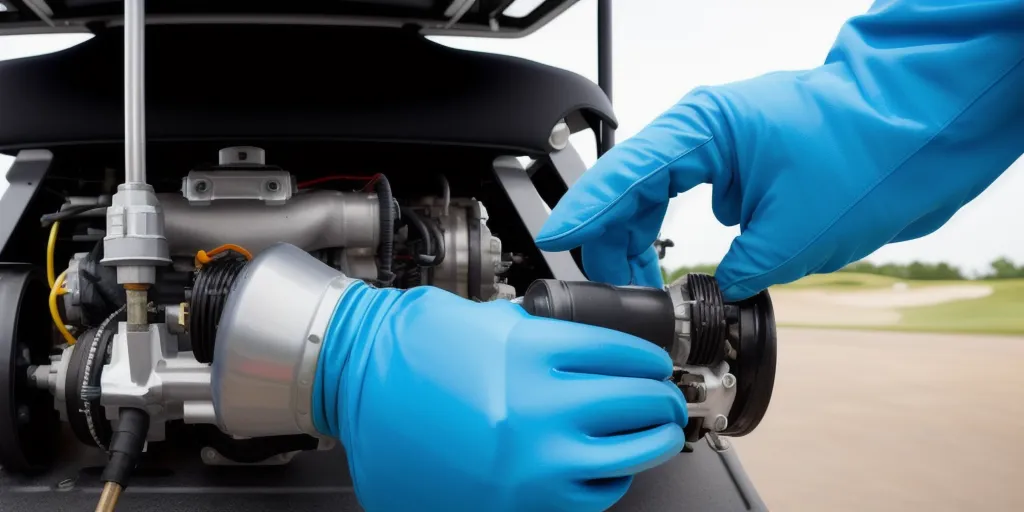-
Shopping Tools
-
Care & Maintenance
-
About
-
Dealer Login

Old gas golf carts are generally noisy due to their internal combustion engines, which generate mechanical sounds from the engine, exhaust, and vibrations. This makes them significantly louder compared to electric models.
Gas-powered golf carts, especially older models, can be much noisier than their electric counterparts. The main reason for this noise is the internal combustion engine (ICE) used to power these carts. These engines operate by burning fuel, which creates mechanical and exhaust noise. This is a natural byproduct of any combustion engine, as opposed to the silent operation of an electric motor.
The most obvious source of noise in gas golf carts is the engine itself. Combustion engines generate noise from various components, including the pistons, crankshaft, and other moving parts. As these parts move to create power, they generate friction, and this friction results in mechanical noise. In older gas carts, the engines may also be less efficient, leading to louder operation.
The exhaust system in a gas-powered golf cart is designed to divert and reduce harmful emissions. However, older models may have less effective mufflers, which increases the noise emitted from the exhaust. Exhaust noise is especially noticeable when accelerating or decelerating, as the exhaust gases are expelled from the engine at varying rates.
Another contributing factor to the noise of gas golf carts is vibrations. Internal combustion engines create vibrations that can resonate through the chassis of the cart, making it louder. Over time, these vibrations can become more pronounced as engine components wear down or as the muffler becomes less effective at reducing sound.
Yes, there are several ways to reduce the noise levels of a gas-powered golf cart, especially if it's an older model. While the engine's noise is inevitable, there are modifications and maintenance practices that can help minimize the overall sound.
One of the most effective ways to reduce exhaust noise is by upgrading the muffler. Many older gas carts have outdated or worn-out mufflers, which are less efficient at dampening sound. By replacing the muffler with a more advanced, high-performance one, you can significantly reduce the noise coming from the exhaust.
Regular maintenance is crucial for reducing engine noise. Over time, engine parts can wear down, leading to more friction and louder operation. By ensuring that the engine is properly lubricated, the components are in good condition, and the engine is tuned correctly, you can help minimize noise. Simple tasks like replacing air filters, spark plugs, and engine oil can improve engine efficiency and reduce noise.
Although it may seem unconventional, some golf cart owners add soundproofing materials to their carts to reduce the overall noise. These materials can be applied to areas where vibrations are most prominent, such as the floorboards and undercarriage. By absorbing some of the noise and vibrations, soundproofing can make the ride quieter.
Loose parts can create rattling and additional noise. It’s important to regularly check the cart for any loose bolts, screws, or panels, especially in older models. Tightening or replacing these parts can reduce unwanted noise and make the cart’s operation quieter.
Despite the noise, gas-powered golf carts offer several benefits that make them appealing for certain uses. Here are some of the advantages of a gas golf cart:
One of the most significant advantages of gas golf carts is their longer range. Gas carts can typically travel farther on a single tank of fuel than electric carts can on a single charge. This makes them ideal for use on larger properties, farms, or in areas where charging stations may be sparse or difficult to access.
Another benefit is the quick refueling time. Unlike electric carts, which need several hours to recharge, gas-powered carts can be refueled in minutes. This makes them more convenient for people who need to use the cart frequently or for long periods of time without waiting for a charge.
Gas carts typically offer more power, which makes them better suited for carrying heavier loads or traveling on rougher terrain. This makes them an ideal choice for utility work, such as transporting tools, supplies, or other equipment across large areas.
With gas golf carts, there is no concern about battery degradation or charging limitations. Gas carts can keep running as long as there is fuel, which minimizes downtime and allows for continuous use. This is particularly useful for commercial or agricultural purposes where efficiency and productivity are key.
Old gas golf carts can be quite noisy due to the inherent noise generated by their combustion engines, exhaust systems, and vibrations. While this is a disadvantage compared to the quiet operation of electric golf carts, there are steps you can take to reduce the noise, such as upgrading the muffler, performing regular engine maintenance, and using soundproofing materials. However, despite the noise, gas golf carts offer significant advantages such as longer range, quick refueling, more power, and reduced downtime, making them a good choice for certain tasks and applications.
